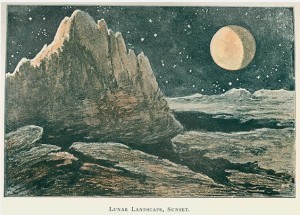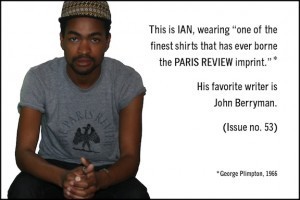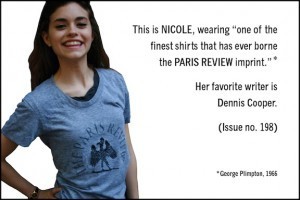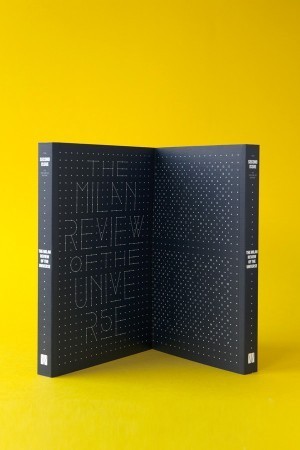The Paris Review's Blog, page 920
May 4, 2012
Moon Madness
 As Shakespeare said, “It is the very error of the moon … she comes more nearer earth than she wont, and makes men mad.” This weekend will see the biggest full moon of the year. The “supermoon" will be at its most visible Saturday night, and we are already scouting our vantage points!
As Shakespeare said, “It is the very error of the moon … she comes more nearer earth than she wont, and makes men mad.” This weekend will see the biggest full moon of the year. The “supermoon" will be at its most visible Saturday night, and we are already scouting our vantage points!
It seems fitting that we should mark the event with a visit to the newly available online picture archive of the venerable Royal Society of London for Improving Natural Knowledge. Founded in 1660, the Royal Society is the world’s oldest scientific library. It’s easy to lose yourself on the site for a few hours—and you should: whether your tastes run to seventeenth-century botanical studies, early lunar photography, or the history of telescopy, you’ll be rewarded by a collection that, a week ago, might have required a plane ticket.
And since 2012 also marks the 110th birthday of the classic silent short A Trip to the Moon, it is meet and right that we pay tribute to Georges Méliès as well! Happy viewing, wherever you are.
Bacon, Sci-Fi, and Feuds

The literary feud hall of fame!
Ploughshares launches the fascinating First Drafts, in which writers discuss their revision process.
Novelist Jane Rogers wins the UK’s science-fiction prize, the Arthur C. Clarke Award, for The Testament of Jessie Lamb.
The future of the e-reader?
Neil Gaiman’s reading and listening list.
New York’s children’s bookstore Books of Wonder plays host to a bacon bakery.
May 3, 2012
Dear Sally Draper, Maybe Wait a Few Years to Read This
You know what’s weird? You could be my mother.
I mean, you’re not, obviously. My mom’s a ginger and Jewish, and her sixties childhood was really quite different from yours, what with her not having Don Draper as a dad or Betty as a mom, and her not seeing her step-grandmother go down on Roger Sterling in the back room at an American Cancer Society Benefit.
So yeah, sucks to be you.
But what if things had gone differently? What if my mom had stayed with that painter who looked like Charles Manson and once punched my grandfather in the face, and my dad had met you instead among the bohemians inhabiting seventies Jerusalem, drinking wine on Old City balconies, discussing poetry and politics, and inhaling the sweetly mingling odors of bellflower and frying falafel?
PEN Presents: “Reviewing Translations”

Here at The Paris Review, the art of translation is a subject near and dear to our hearts. Tonight, join
Haykanush Avetisyan, Ruth Franklin, Julya Rabinowich, and our very own Lorin Stein as they discuss the tricky business of reviewing translations. To quote the PEN World Voices site,When a translated work is reviewed, what exactly is being critiqued? Is it the work itself or the quality of its translation? How does reviewing a translation differ from reviewing a work in its original language? Should critics be bilingual? Should they be experts in the literature and history of foreign cultures?
Cosponsored by the Austrian Cultural Forum, Ledig House, the PEN Translation Committee, the National Book Critics Circle, and the School of Writing at the New School. For details, see the PEN Web site.
Introducing the 1966 Tee
In celebration of its two-hundredth issue, The Paris Review is proud to present the Winter 1966 T-shirt. Modeled on a nifty shirt that we discovered on the back cover of issue 36, the design is George Plimpton’s own. As he stated in that ad, it’s “the sort of once in a very rare while shirt that makes an editor proud to do his job.”
To celebrate the ’66, we took to the street, asking some New York friends to name their favorite Paris Review authors. In the coming days, watch this space to see their picks.
And for a limited time we’re offering a special deal: the T-shirt plus a year’s subscription for $40, giving you access to the greatest writers (and T-shirts!) of today.
Printed on American Apparel 50/25/25’s, the shirt comes in men’s (S, M, L) and women’s sizes (M, L).
To quote George, we beg you to “share with us the thrill of wearing it.”
Offer good for U.S. addresses only.
Beautiful Bookshelves, Rule Breaking, and More!
The Tehran International Book Fair cracks down on “harmful” titles.
“Poets break all the rules. When other writers take their photos outdoors, poets stay inside. They’re the only ones who wear hats or leather jackets with nothing underneath.”
Target will no longer be in the Kindle business. (A sentence that would have mystified our forebears.)
“The passive voice remains an important arrow in the rhetorical quiver. After all, it exists for a reason.”
A gallery of beautiful bookshelves.
May 2, 2012
Memories of the Lakeside
To East Villagers of a certain age, it came as a blow: after sixteen short years on Avenue B, the Lakeside Lounge has closed. For many of us, that bar was like our living room. I don't mean that my friends and I spent a lot of time there—I mean it was a lot like our apartments. The Steve Keene acrylics on the walls, the mismatched bench and tables, the overflowing ashtrays. The fug. 
The great advantage of the Lakeside over one’s living room was the music. This isn’t the place to talk about jukeboxes in general, much less the work of art in the age of digital reproduction, but that jukebox was a big deal. I remember making a special trip to the Lakeside one night, alone, in the snow, just to hear “Sitting on Top of the World” as performed by the Mississippi Sheiks.
I also remember stopping there for a beer by candlelight the night of the blackout. It was strange to sit there in the silence. Every other night the place was full of music. I never saw Iggy Pop or Dee Dee Ramone at the Lakeside, but I did hear Jason Morphew and the Reachers play whenever they came to town. It was there I first heard that verse, from Geoff Reacher’s “Paranoia Is Fame,” worthy of the Louvin Brothers:
Slowly my mind opens more and more
And when I’m dead it will be a beautiful flower
Blooming, choking out the weeds
Photosynthesizing starlight in the garden’s darkest hour
The other great attraction of the Lakeside was its photo booth. That machine took magically good photos, photos for the photo averse, as, for example, the poet Frederick Seidel (shown here with my sister, Anna O’Sullivan). One of the pictures was so unflattering, so off-putting, so deeply dour, that Seidel put it on the cover of his collection Ooga-Booga.
An Event in the Stairwell
The Milan Review—or, to give it its proper title, The Milan Review of the Universe—is an egregiously handsome literary magazine published in English, in Milan, under the editorship of the improbably named Tim Small. The second issue includes work by some of our own favorites, among them Amie Barrodale, Chiara Barzini, Francesco Pacifico, Lynne Tillman, and not least Clancy Martin, whose story the Milanesi have kindly let us reprint below, in a spirit of international fraternità, and in light of the patchy trans-Atlantic distribution that our two journals have in common. Auguri!—Lorin Stein
Randy knocked on my door and when I opened it I expected he would attack me with the tennis racket in his hand. I had only bought pot from him before. He had no reason to hate me. But in his mind I am a rich white person.
“Emily’s not home,” I said. Emily is my girlfriend and I suspect, though do not know, that she has had sex with Randy at least once, or perhaps lots of times. He is younger and lither than I am. Probably better hung.
“She’s not home?”
“Right.” I kept my eyes on the racket. Also on his eyes, because you can anticipate a blow that way. Everyone narrows his eyes and looks where he’s going to hit you before he strikes. This is the first lesson of boxing.
“She promised she’d buy this racket from me. I got this racket special. From my daughter.”
Randy, Emily had told me, had a high-school age daughter who was expected by many people to be the next Serena Williams. She lived with her mother in the Bronx and was sponsored by Puma. I noticed the tennis racket had a broken string. Emily was hiding in the bedroom all this time and had instructed me to tell Randy that she was out. I could not decide whether that was reassuring or suspicious.
Emily had had her infidelities.
“How much does she owe you for the racket?”
I took the racket from his hand which he gave me without hesitation, although he looked down and away from me when he said, “thirty dollars,” which meant he was lying. Probably he had told her he would give her the racket for free. But who knew what more tangible price she had promised to pay. Perhaps eagerly.
I briefly considered beating Randy on the face, head and shoulders with the very light and surely durable racket. We have tile in our stairwell and blood would mop up easily without staining. Randy was not the type to come back with a gun. That would be the last we’d ever see of him. I should have done it.Read More »
Literary Paint Chips: Gallery 2
Paint Samples, suitable for the home, sourced from colors in literature. As seen in our two-hundredth issue. See Gallery 1 here.




Havisham’s Complexion1
Anti-Sex Scarlet2
Plum Purple3
Closed Eyelid4




Green Paste5
Rain Stone6
Nothing7
Esther’s Sauce8




Anthracite Brazier9
Dove10
Encrimsoned11
Foul Mood12




Snot13
Eyes14
Aschenbach’s Youth15
Saffron Silk16




Elm Shadow17
Paris18
Paper Smell19
England20




Rat Brown21
20,00022
Dorian Scarlet23
Lilac Ocean24




Basking Pear25
March Morning26
Sour Apple27
Gulag28
Annotations“ ‘Dear Miss Havisham,’ said Miss Sarah Pocket. ‘How well you look!’ ‘I do not,’ returned Miss Havisham.‘I am yellow skin and bone.’” ‘Great Expectations,’ Charles Dickens.“A narrow scarlet sash, emblem of the Junior Anti-Sex League, was wound several times round the waist of her overalls, just tightly enough to bring out the shapeliness of her hips.” ‘Nineteen Eighty-Four,’ George Orwell.“ ‘Not those socks, Jeeves,’ I said,gulping a bit but having a dash at the careless, off-hand tone. ‘Give me the purple ones.’ ‘I beg your pardon, sir?’ ‘Those jolly purple ones.’ ‘Very good, sir.’ ” ‘The Inimitable Jeeves,’ P. G. Wode- house.“I pulled up my feet, bent my knees, and rested my chin on my hand. Then I closed my eyes. Still no sounds. The darkness behind my closed eyelids was like the cloud-covered sky, but the gray was somewhat deeper.” ‘The Wind-up Bird Chronicle,’ Haruki Murakami.“I bought makeup in tubes off a rack, and in the cold and dirty toilet of the gas station, I attempted a transformation, slapping buff-colored liquid over my face and rubbing green paste on my eyelids.” “Dulse,” Alice Munro.“A rainstorm would last hours, soaking the ruined outbuilding nearby, darkening its stones.” “St. Martin,” Lydia Davis.“Taken to his uncle’s house once, he had stumbled on her in the soft pink bedroom. Ida had just emerged from her bath and she sat in a powder blue nothing before a mirror at a little table crammed with jars.” ‘The Apprenticeship of Duddy Kravitz,’ Mordecai Richler.“He taught me how to eat avocados by melting grape jelly and french dress- ing together in a saucepan and filling the cup of the pear with the garnet sauce.” ‘The Bell Jar,’ Sylvia Plath.“At the street corner there was a brazier alight, the red cones of anthracite beautifully glowing, and a whiff of heat shedding from it.” ‘Girls in Their Married Bliss,’ Edna O’Brien.“Passersby, who, of course, stopped and stared, had just time to see a face of the very greatest importance against the dove-gray upholstery, before a male hand drew the blind and there was nothing to be seen except a square of dove gray.” ‘Mrs. Dalloway,’ Virginia Woolf.“Feeble gleams of encrimsoned light made their way through the trellised panes, and served to render sufficiently distinct the more prominent objects around.” “The Fall of the House of Usher,” Edgar Allan Poe.“At home I’d slept for several hours then woke to a blue light and in a foul mood.” ‘Ticknor,’ Sheila Heti.“Tom was crying. He put his knuckles in his eyes the way little girls do on biscuit tin lids. A large tube of green snot hung out of one nostril, and when he sniffed it bobbed out of sight.” ‘The Cement Garden,’ Ian McEwan.“Pretty eyes. Pretty blue eyes. Big blue pretty eyes. Run, Jip, run. Jip runs, Alice runs. Alice has blue eyes. Jerry has blue eyes. Jerry runs. Alice runs. They run with their blue eyes. Four blue eyes. Four pretty blue eyes. Blue-sky eyes. Blue-like Mrs. Forrest’s blue blouse eyes. Morning-glory-blue-eyes. Alice-and-Jerry-blue-storybook-eyes.” ‘The Bluest Eye,’ Toni Morrison.“ ‘Surely you will permit me to restore what belongs to you?’ ‘How?’ asked Aschenbach. For answer the oily one washed his client’s hair in two waters, one clear and one dark, and lo, it was as black as in the days of his youth.” ‘Death in Venice,’ Thomas Mann.“But still at home, ignoring him, I’ll stay . . . Beautiful, clad in saffron silks all day.” ‘Lysistrata,’ Aristophanes.“On a sheep-cropped knoll under a clump of elms we ate the strawberries and drank the wine—as Sebastian promised, they were delicious together—and we lit fat, Turkish cigarettes and lay on our backs, Sebastian’s eyes on the leaves above him, mine on his profile, while the blue-gray smoke rose, untroubled by any wind.” ‘Brideshead Revisited,’ Evelyn Waugh.“In Paris, Cyril had a room away from his mother. I could already imagine the window open to the pink and blue sky, the wonderful sky of Paris, with the pigeons cooing on the windowsill, and with Cyril beside me on the narrow bed.” ‘Bonjour Tristesse,’ Françoise Sagan.“It used to disturb me at first. I thought seriously of burning the house—to reach the smell. But now I am used to it. The only thing I can think of that it is like is the color of the paper! A yellow smell.” “The Yellow Wallpaper,” Charlotte Perkins Gilman.“At Gatwick they found a taxi without difficulty. It was raining, as it always seemed to be when you returned to England. Graham gazed through the speckled window. Why did every- thing green seem to have so much brown in it here? And how was it possible for things to be both damp and dusty at the same time?” ‘Before She Met Me,’ Julian Barnes.“It was a rough and ugly thing, an overall length of twenty-eight feet, a five-foot draft and just that one junk sail, but with a respectable three hundred and fifty square feet. A trim tab rudder hung on the stern. She was heavy and slow. And very ugly. I made her more ugly by painting her rat brown.” ‘The Shipping News,’ Annie Proulx.“The solar rays shone through the watery mass easily, and dissipated all color, and I clearly distinguished objects at a distance of a hundred and fifty yards. Beyond that the tints darkened into fine gradations of ultramarine, and faded into vague obscurity.” ‘Twenty Thousand Leagues Under the Sea,’ Jules Verne.“His finely chiseled nostrils quivered, and some hidden nerve shook the scarlet of his lips and left them trembling.” ‘The Picture of Dorian Gray,’ Oscar Wilde.“The sky turns a soft lilac. Seeing this magnificent, enchanting sky, the ocean frowns at first, but soon itself takes on such tender, joyful, passionate colors as human tongue can hardly name.” “Gusev,” Anton Chekhov.“Grapes for the asking, / Pears red with basking / Out in the sun, / Plums on their twigs; / Pluck them and suck them, / Pomegranates, figs.” “Goblin Market,” Christina Rossetti.“It was a typical March morning when we got up to drive them to the train: blowy, dark, with spits of rain now and then.” ‘The Country Wife,’ Dorothy Van Doren.“White halogen off the green of the composite surface, the light out on the indoor courts at the Port Washington Tennis Academy is the color of sour apples.” ‘Infinite Jest,’ David Foster Wallace.Both of us were weak, dried out; our skin was grayish-yellow on our bones.” ‘The Gulag Archipelago,’ Aleksandr Solzhenitsyn.
‘Bartleby,’ ‘Star Wars,’ and Animal Authors
May Day viewed through the prism of Bartelby the Scrivener .
In Afghanistan, women are risking their lives for poetry.
The Metropolitan Museum of Art’s wall text will now reflect Gertrude Stein’s complicated war record.
Controversial almost-ran New Yorker covers.
The Star Wars cookbook.
Last but not least, books authored by famous animals.
The Paris Review's Blog
- The Paris Review's profile
- 305 followers












